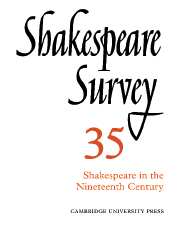Book contents
- Frontmatter
- Before the Shakespeare Revolution: Developments in the Study of Nineteenth-Century Shakespearian Production
- The Meininger Company and English Shakespeare
- Shakespeare at the Burgtheater: From Heinrich Anschütz to Josef Kainz
- Shakespeare on the Melbourne Stage, 1843-61
- Shakespeare in Hazlitt’s Theatre Criticism
- Characterization of the Four Young Lovers in A Midsummer Night’s Dream
- Queenly Shadows: On Mediation in Two Comedies
- Language, Theme, and Character in Twelfth Night
- The Art of the Comic Duologue in Three Plays by Shakespeare
- ‘Spanish’ Othello: The Making of Shakespeare’s Moor
- Ferdinand and Miranda at Chess
- Shakespeare’s Latin Citations: The Editorial Problem
- The Theatre at Christ Church, Oxford, in 1605
- Interpretations of Shakespearian Comedy, 1981
- The Year's Contributions to Shakespearian Study 1 Critical Studies
- 2 Shakespeare’s Life, Times and Stage
- 3 Textual Studies
- Index
- Plate Section
Queenly Shadows: On Mediation in Two Comedies
Published online by Cambridge University Press: 28 March 2007
- Frontmatter
- Before the Shakespeare Revolution: Developments in the Study of Nineteenth-Century Shakespearian Production
- The Meininger Company and English Shakespeare
- Shakespeare at the Burgtheater: From Heinrich Anschütz to Josef Kainz
- Shakespeare on the Melbourne Stage, 1843-61
- Shakespeare in Hazlitt’s Theatre Criticism
- Characterization of the Four Young Lovers in A Midsummer Night’s Dream
- Queenly Shadows: On Mediation in Two Comedies
- Language, Theme, and Character in Twelfth Night
- The Art of the Comic Duologue in Three Plays by Shakespeare
- ‘Spanish’ Othello: The Making of Shakespeare’s Moor
- Ferdinand and Miranda at Chess
- Shakespeare’s Latin Citations: The Editorial Problem
- The Theatre at Christ Church, Oxford, in 1605
- Interpretations of Shakespearian Comedy, 1981
- The Year's Contributions to Shakespearian Study 1 Critical Studies
- 2 Shakespeare’s Life, Times and Stage
- 3 Textual Studies
- Index
- Plate Section
Summary
And anyway, is it really possible that in logic I should have to deal with forms that I can invent? What I have to deal with must be that which makes it possible for me to invent them.
(Ludwig Wittgenstein, Tractatus Logico-Philosophicus, 5-555)It has long been held that Shakespeare reflects abiding human truths, the greatness and endurance of his plays flowing from their knowledge about life and from the poetic grandeur expressing this. I would not deny our author's 'universality', but I hope to redefine it, examining less 'what he has to say' than a coherence of materials and theme, historical context and cognitive form which makes communication with audiences possible at all.
To suggest this, however modestly in such an essay, I use methods pioneered by Claude Levi- Strauss which, in turn, reinforce insights of Marx. The discussion is, without question, preliminary (even of the dramas selected); yet it may be considered self-sufficient, and is intended as provocative of later research whose final achievements may require computers and Boolean algebra. Using orthodox general interpretations of The Merchant of Venice and A Midsummer Night's Dream, I do not struggle to impose new fundamental readings. Instead, I hope to identify something of how and why particular dramatic rhythms engaged Shakespeare's imagination, and therefore something of how and why they continue to attract us who bear a like (although inferior) sensibility - one compounded of socially-educated responses and yet, perhaps, also of cognitively innate predispositions.
- Type
- Chapter
- Information
- Shakespeare Survey , pp. 65 - 78Publisher: Cambridge University PressPrint publication year: 1982



